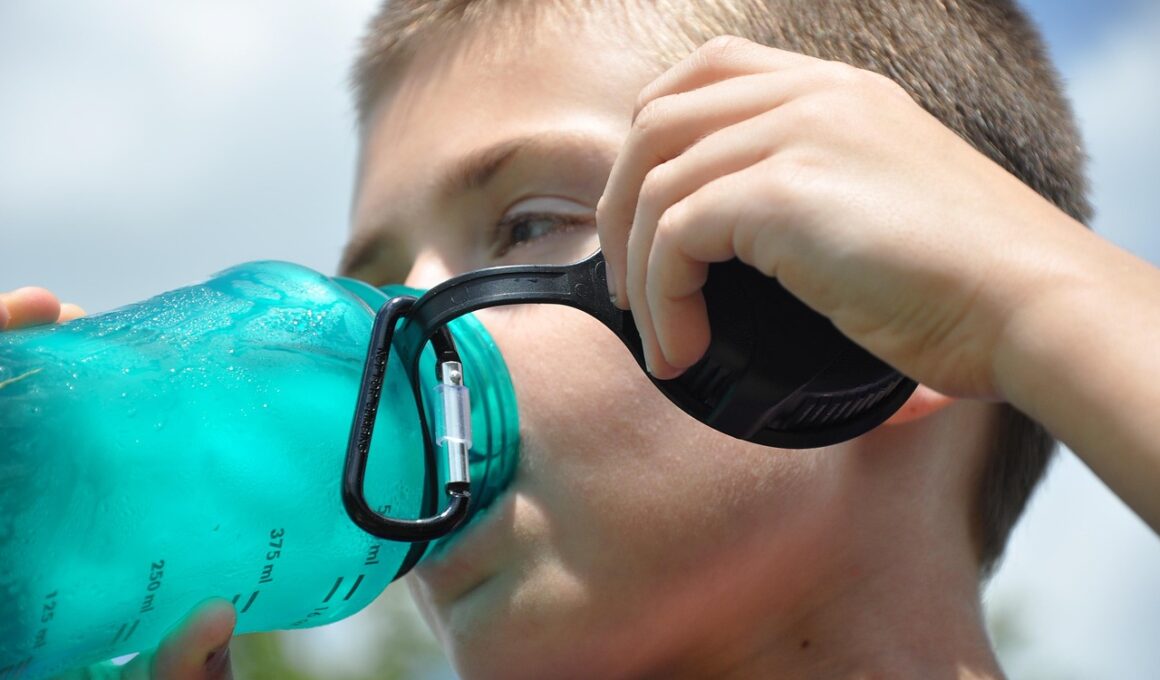Best Drinks for Hydration Before, During, and After Exercise
Hydration is a crucial aspect of fitness, impacting performance and recovery during any workout. While water is the simplest choice, there are various drinks that can enhance hydration. Before exercising, consider beverages rich in electrolytes, which can prepare your body for the upcoming exertion. Options include coconut water, which is a natural source of electrolytes, or sports drinks that contain sodium, potassium, and magnesium. These can effectively prevent dehydration, especially during intense workouts. Always remember to drink fluids at least 30 minutes before starting. Some individuals enjoy a pre-workout shake, combining protein and carbs, to boost energy levels. Tailoring your hydration strategy to the type of exercise is vital. If you plan on longer cardiovascular activities, aim for drinks packed with carbohydrates for sustained energy. Additionally, note your sweating rate, as this can dictate how much and which drinks you will need. Always choose brands with low sugar content as excess sugar might cause a crash. Pay attention to your body’s needs, and effectively hydrate yourself on the go.
During Exercise: Optimal Drink Choices
Staying hydrated during exercise can significantly enhance performance. Consuming fluids while working out prevents fatigue and heat-related issues. For activities lasting more than an hour, choose drinks containing carbohydrates and electrolytes. Science shows that a good ratio is 6-8% carbohydrates to maintain energy levels. Popular options include sports drinks and electrolyte solutions tailored for athletes. These drinks provide essential nutrients to sustain your endurance. Additionally, the flavor of these drinks may encourage more hydration, especially if you struggle with plain water. For those who prefer a natural alternative, electrolyte-infused water can be made with a pinch of salt, lemon juice, and a touch of honey. This homemade option is not only refreshing but also provides the necessary minerals. Ensure you’re sipping regularly, about every 15 minutes, to keep your hydration levels optimal. Monitor your body for signs of dehydration, such as reduced performance or dizziness. Even small amounts of dehydration can hinder your workout. Always customize your drink choice based on the duration and intensity of your exercise for the best results.
After exercise, replenishing lost fluids is crucial for recovery and performance improvement. Immediately following a workout, it’s essential to hydrate adequately with a drink that combines both water and electrolytes. Options here include sports drinks like Gatorade or Powerade, which restore both hydration and lost salts. Recovery drinks are crucial for athletes and can help provide a quick balance of body nutrients. Many athletes choose protein shakes that include hydration components, which help restore energy levels efficiently. Alternatively, coconut water is an excellent post-workout choice due to its high potassium content, which can reduce muscle cramps. Additionally, the natural sugars in coconut water create an energy boost, aiding in overall recovery. You can also consider smoothies made with yogurt, fruits, and a liquid base, such as almond milk. These not only hydrate but also provide essential nutrients needed after physical exertion. Monitor your body’s hydration status by checking urine color – light yellow indicates good hydration, while dark yellow signals dehydration. Consistently hydrating after workouts will help you maintain performance during subsequent activities.
Optimal Hydration Strategies
Implementing effective hydration strategies is important for achieving overall fitness goals. Start by creating a hydration schedule that includes fluids before, during, and after workouts. This can ensure your body remains fueled and can perform at its peak. One way to gauge hydration needs is by listening to your body signals, such as thirst and urine color. Adequate hydration should become a routine, as neglecting these practices could lead to decreased performance. Invest in a good water bottle you can carry around to promote regular fluid intake. Remember, hydration needs can vary based on exercise intensity, duration, and environmental conditions. Heat and humidity levels can significantly affect your sweat loss. Augment your hydration strategy with high-water content foods, such as cucumbers, watermelon, and oranges. These can supplement your overall fluid intake, especially when combined with regular beverage consumption. Prior to events or intense workouts, consider hydrating better the day before, ensuring your body is fully prepared. Maintaining awareness of personal hydration levels will maximize your performance and enhance recovery.
While there are standard beverages recommended for hydration, individual preferences can significantly change choices. It’s key to find what works best for you personally. Some athletes may prefer specialized drinks, while others might stick to plain water. The beverage choice could depend on the type of exercise you engage in or the environment where you are performing. If you find it tricky to consume enough water, incorporate hydration in creative ways, such as flavored water or herbal teas. Exploring various tastes might help adapt your hydration habits. You can assess options like electrolyte tablets that dissolve in water, allowing you to create your own flavor preferences while maintaining essential nutrient intake. Consider limiting your intake of highly sugary or caffeine-based drinks, as they may cause dehydrate effects. Instead, explore beverages like green tea or herbal infusions, which can hydrate while providing other health benefits. Keep in mind that every athlete is different. By assessing personal needs and analyzing hydration responses, you can tailor your hydration strategy to best fit your fitness goals.
Summary of Key Drinks
The importance of selecting the right drinks for hydration can’t be overstated in any workout regimen. Here’s a quick summary of optimal choices: First, plain water is always a staple for short sessions or low-intensity workouts. For events extending over an hour, consider electrolyte-enhanced drinks with the right amount of carbohydrates. Coconut water offers a natural alternative, full of light flavor and nutrients. Additionally, recovery drinks that contain protein can help speed up recovery times. Smoothies filled with fruits and greens can be perfect for post-workout nourishment and hydration. These options not only taste great, but they also pack a nutritional punch. Always aim for a balance between hydration and energy replenishment, which means a tailored strategy based on exercise type. Remember that hydration should be continuous, not just limited to before or after exercise periods. Snacks rich in water content can add to fluid intake, keeping your cells hydrated throughout the day. Always ensure to listen to your body, adjust your strategy based on experiences, and stay consistent to achieve your fitness goals.
In conclusion, understanding hydration is crucial for improving performance and recovery in any fitness routine. By incorporating a mix of hydration drinks, you can significantly boost your energy levels and reduce the risk of fatigue and dehydration. Proper hydration pre-, during, and post-exercise is beneficial for all fitness enthusiasts, from beginners to seasoned athletes. Drinking should remain a habit embedded in your fitness routine. Recognize your needs based on unique workouts and environments, adjusting beverages accordingly. The success of your fitness journey often lies in small practices like proper hydration. Encourage your peers to adopt these hydration strategies as well, fostering a culture of awareness. Overall, remember that every body is different; assess your hydration responses and adjust accordingly. Tailor your choices to fit your personal preferences, ensuring performance maximization. Ultimately, achieving optimal hydration can directly impact your physical successes and mental well-being during workouts. Keep pushing your limits while ensuring you remain adequately hydrated; this balance is vital for any successful fitness regimen.


